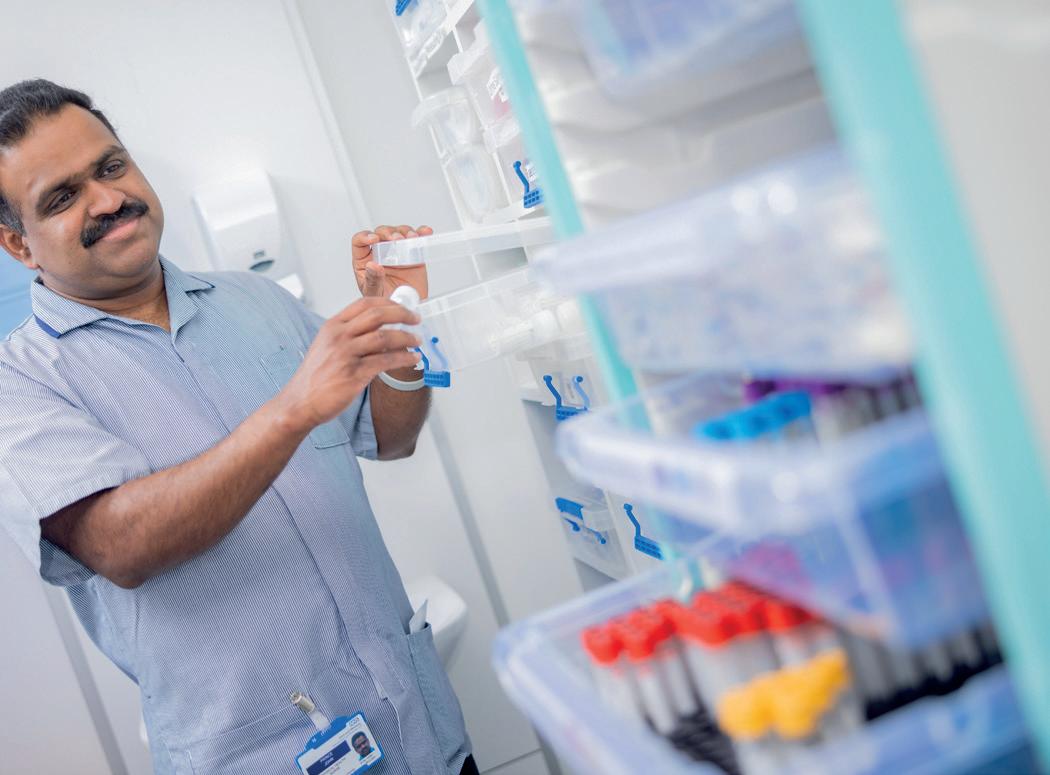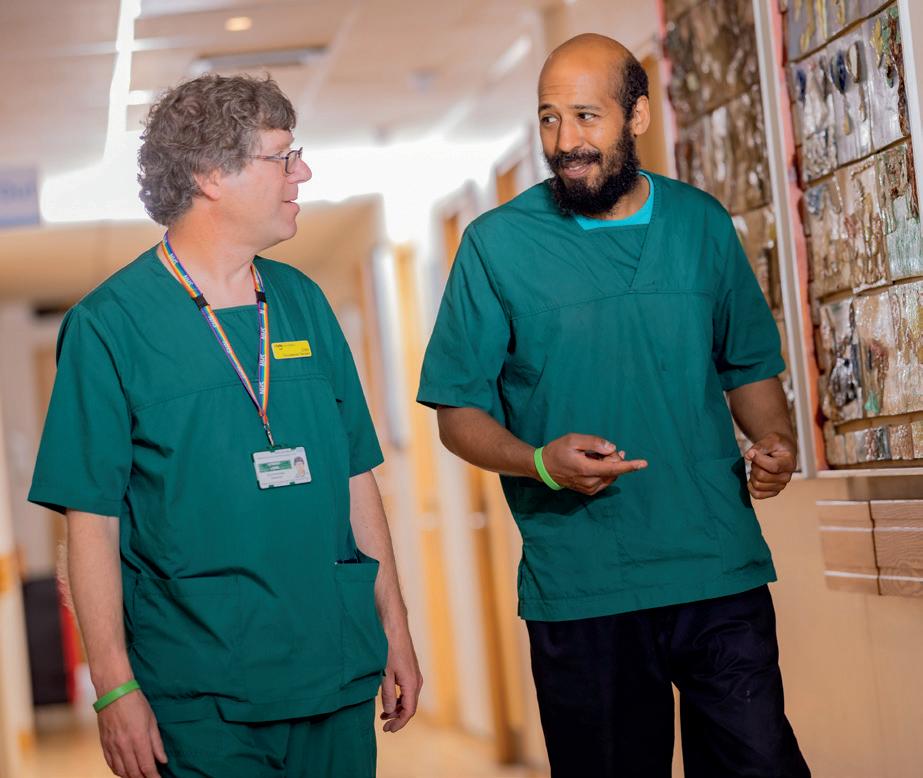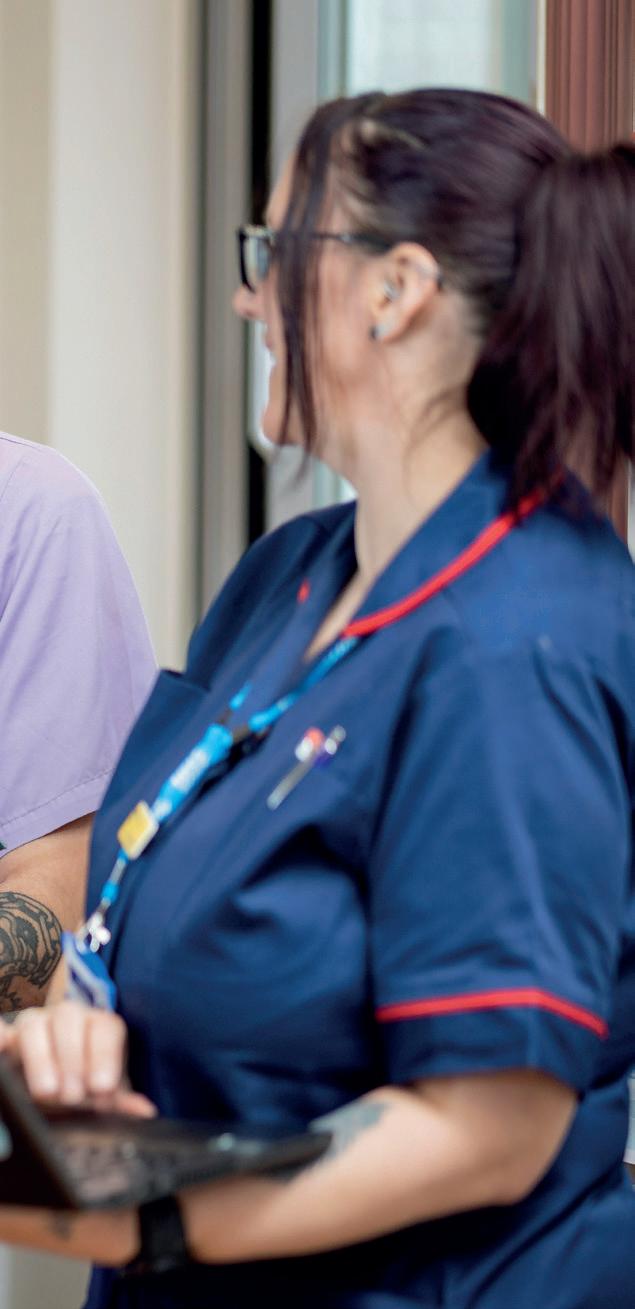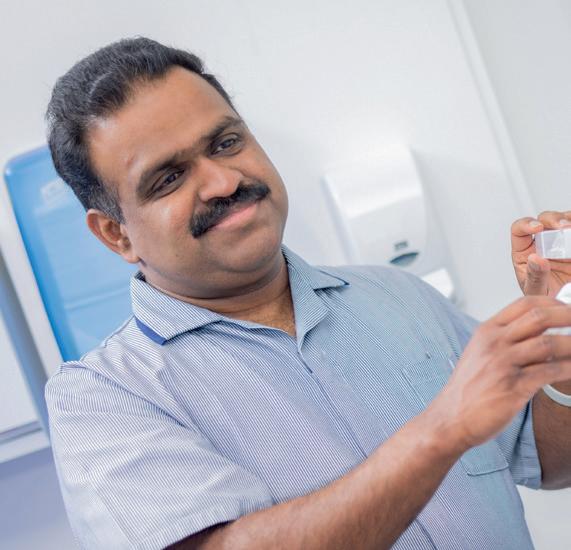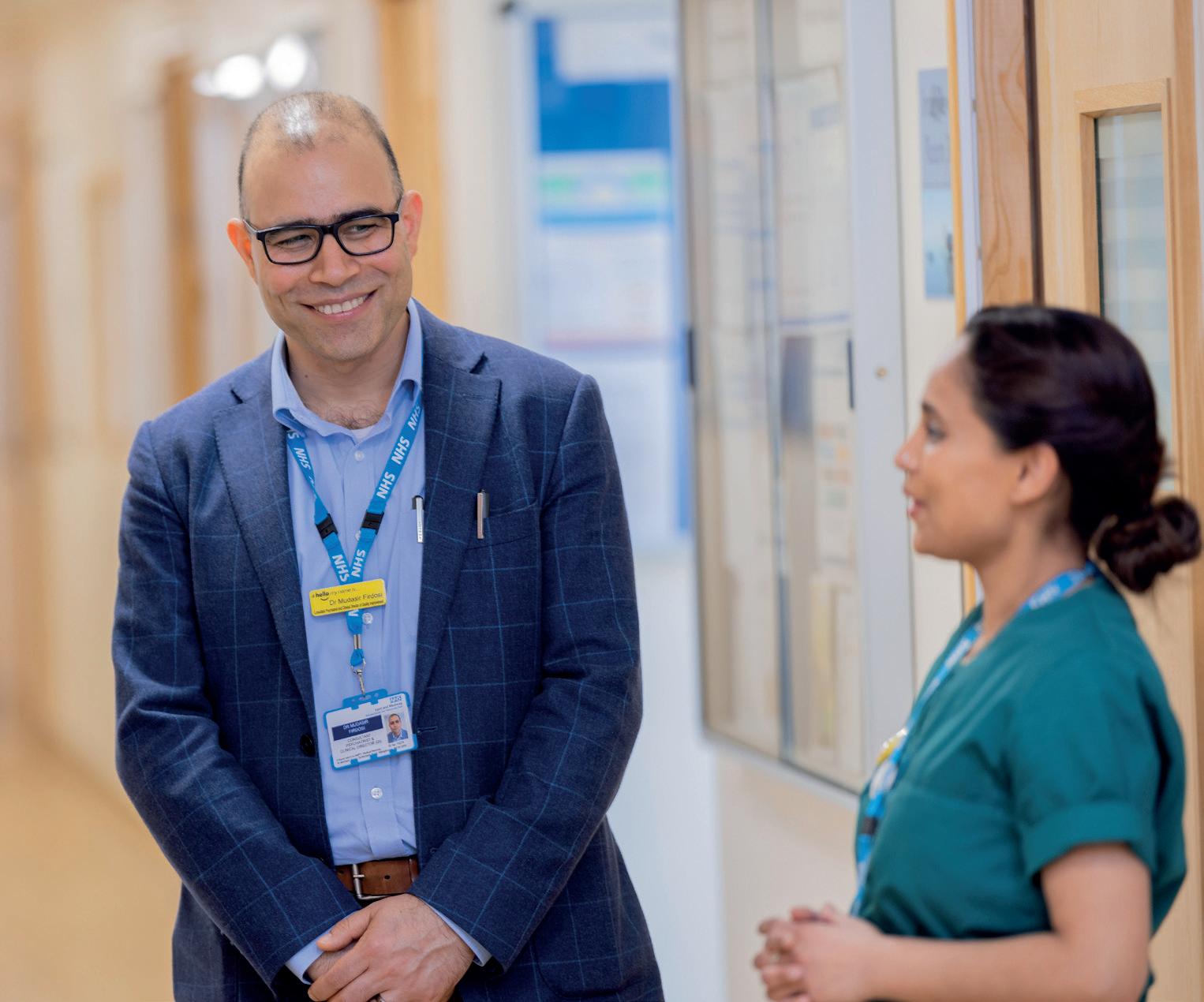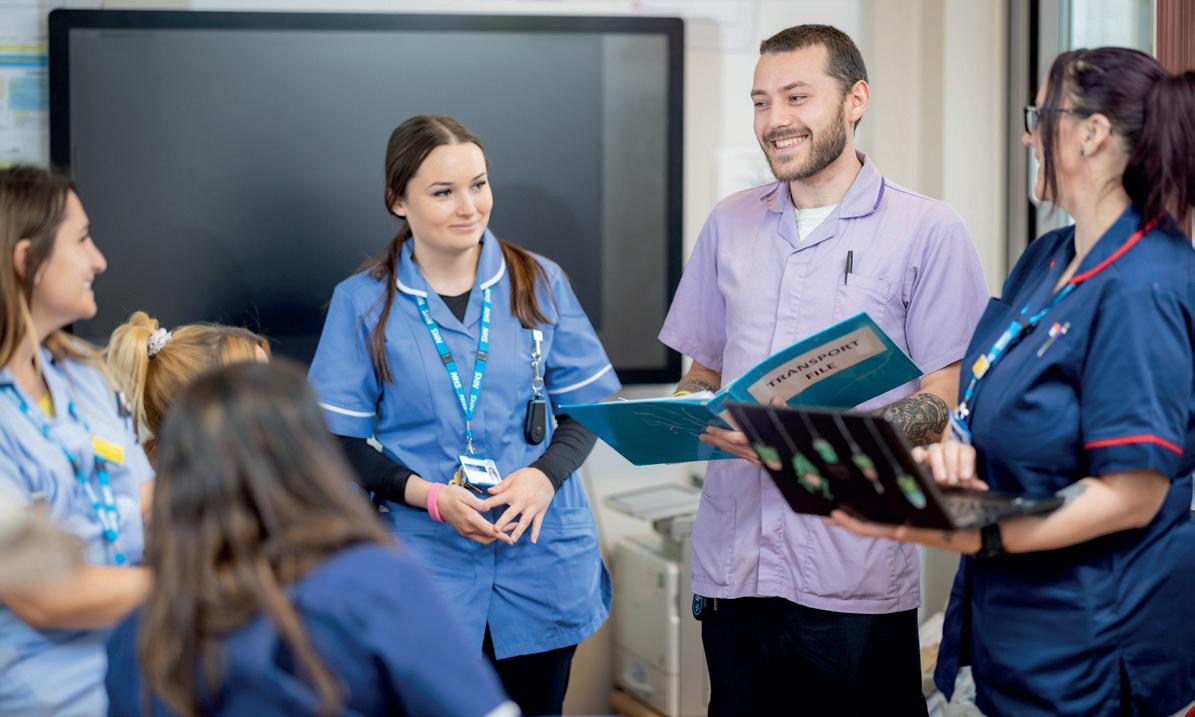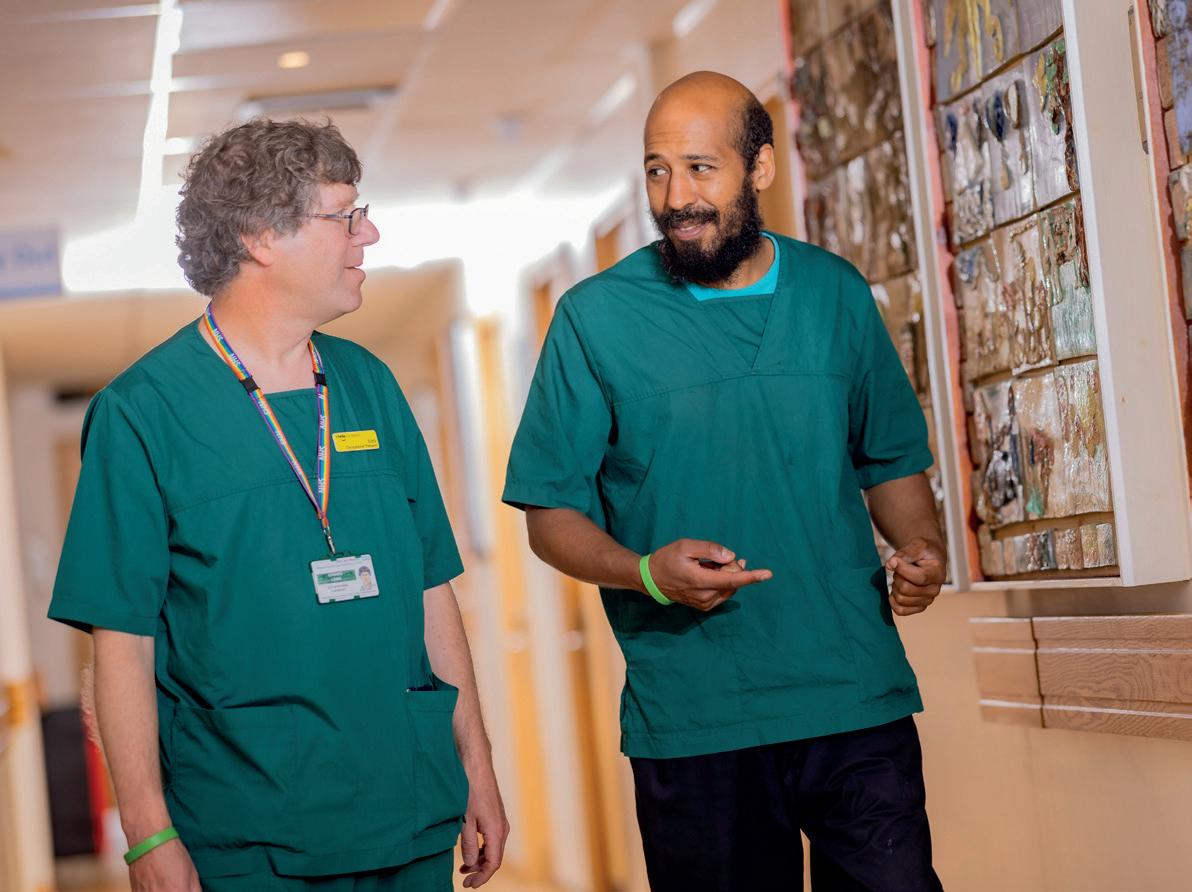2.2 An Introduction to KMPT and the role of NHS Organisations in Spreading Opportunity and Meeting the Purpose Goals
NHS organisations can, and do, make a real and sustained difference to create positive change for their workers, patients and society at large. These organisations are central to their local communities and they can be accessible institutions that reach out to everyone. As COVID-19 exacerbated existing health inequalities and created a huge burden for the NHS, these organisations will also need help from elsewhere to recover and strengthen, just like the rest of the country. However, as one of our most widereaching and cherished public institutions, the NHS will be essential in leading the way by leveraging its position in communities and its size
and power as an employer and organisational entity. In doing this, it can help level up the UK.
The Purpose Goals provide an ambitious and strategic solution to addressing the challenge, setting out for the first time the gaps that will need to be filled to ensure opportunity and fair outcomes are available to all across the country. The goals offer a common framework with which organisations can collate best practice and show impact across all of the key life stages and areas of concern. They provide the shared language needed to collectively discuss the challenges of boosting social mobility nationwide, and the solutions to existing inequalities.
The role of the NHS
By utilising the voice, reach and reputation of the NHS, organisations like KMPT can truly act as anchor institutions to level up the regions in which they operate.
That ambition should apply to one of the country’s most important and impactful institutions, the National Health Service. Of course, the NHS in its day-to-day function makes an enormous contribution to the public and individual good of the UK. As a commissioner and provider of healthcare, the NHS can target services and outreach to address directly the inequalities that exist in health outcomes and experiences, especially among those who suffer most under other forms of social or economic exclusion. Health and wellbeing are vitally important to the function of a happy, prosperous and equal country.
NHS organisations have a much wider reach than just health and many, rightly, now see themselves as important anchor institutions within their communities. Aside from the obvious health impacts, there are other aspects of the Purpose agenda that the NHS is well placed to help address. The NHS is the largest single employer in the UK; as of January 2021 there were 1,179,008 NHS Hospital and Health Service staff, with jobs ranging from healthcare provision, information technology, administration and health policy. Its predominance in the employment market can be used to increase social mobility and spread opportunity throughout society. By providing employment and career progression on such a large scale, the NHS makes a vital contribution to the economy, labour market and the available opportunities for individuals across the country. The NHS can help ensure that it makes the best use of the incredible talent the UK has to offer by providing many people with worthwhile careers that contribute to the social good.
In its healthcare provision, organisation and information outreach, the NHS also has a sizable digital presence. COVID-19 has accelerated the digital transformation and NHS trusts now interact with patients and staff more than ever before. A Health Foundation report found that of those who received NHS care or communicated with the NHS in 2020, 97 per cent used technology and 82 per cent of NHS staff surveyed said they had used technology more in the past year. It is therefore in both the NHS’ interests and capabilities to contribute to making this transition fair and accessible.
Likewise the transition to a green and net zero economy has also accelerated. As it is such a large institution with large estates, efforts made by NHS organisations to use more renewable energy to run their services more sustainably will have a substantial impact. For example, in October 2020 the NHS adopted a multi-year plan with targets and milestones to become the world’s first carbon net zero national health system by 2040.
NHS organisations can have a wider impact on the economy through how it procures goods and services. Overall, the NHS has a budget of £130 billion. This spending power and its significant economic levers gives it real potential to ensure its extensive supply chains and procurement processes aid in the green recovery and social good more generally.
The NHS is held in high regard by the public and communities all across the country. Its presence in every region and community in the UK means that it can influence and speak up for those places and communities that might be at risk of being left behind. By utilising the voice, reach and reputation of the NHS, organisations like KMPT can truly act as anchor institutions to level up the regions in which they operate.
The Purpose Agenda simply cannot be achieved without the participation of the National Health Service. NHS organisations are in a unique position to combat some of the barriers to upward social mobility that exist in the UK, and they have to be part of the solution. KMPT has already embarked on that journey and, as part of its work with the Purpose Coalition, will be working towards even more transparent and measurable outcomes.
Background
Established in 2006, KMPT was commissioned to provide secondary mental health services across Kent and Medway, both in the community and within inpatient settings.
KMPT is a core value organisation which sets internal aspirations to become recognised externally and across the country for excellence.
KMPT has a skilled and committed workforce of over 3,700 employees in clinical and nonclinical roles working in partnership across the county with Kent County Council, Clinical Commissioning Group’s and other Trusts to deliver high quality services.
Working in partnership with Kent County Council and the unitary authority in Medway,
The Trust is commissioned by Kent and Medway Clinical Commissioning Group and NHS Specialist Commissioning.
With an annual income of £194.6 million and covering a vast rural and urban area - with increasingly diverse communities spread across an area of 1,450 square miles - KMPT has the reach to affect wide-reaching social impact through purpose-driven action.
The Trust cares for over 2,000 adults each year in its hospitals, as well as 54,000 adults in the community.
KMPT launched a new organisational strategy in April 2023 which sets out their priorities for the next three year period.
The strategy has six clear priorities with targets in place to ensure that progress is being made.
> Priority 1 - “We deliver outstanding, person centred care that is safe, high quality and easy to access.”
> Priority 2 - “We are a great place to work and have engaged and capable staff living our values.”
> Priority 3 - “We lead in partnership to deliver the right care and to reduce health inequalities in our communities.”
> Priority 4 - “We use technology, data and knowledge to transform patient care and our productivity.”
> Priority 5 - “We are efficient, sustainable, transformational and make the most of every resource.”
> Priority 6 - “We create environments that benefit our service users and people.“
As well as putting measurements in place across these ambitions, the Trust also has areas of focus which align with the wider healthcare system.
Purpose
KMPT’s commitment as an organisation to the purpose agenda and a wider deliverance of social value is underpinned by its overarching vision: to provide brilliant care through brilliant people.
This understanding by the Trust is key - to deliver effectively for patients and thus the wider community, its colleagues and the employee experience must be held to the highest possible standard.
The Trust’s vision is to ‘To provide outstanding care and to work in partnership to deliver this in the right place, for every service user, every time.’
This vision is delivered by the following strategic ambitions for different stakeholders:
People we care for: We deliver outstanding, person-centred care that is safe, high quality and easy to access.
People who work for us: We are a great place to work and have engaged and capable staff, living our values.
Partners we work with: We lead in partnership to deliver the right care and to reduce health inequalities in our communities.
These are supported by strategic enablers that allow all of these ambitions to come to fruition:
We use technology, data and knowledge to transform patient care and our productivity.
We are efficient, sustainable, transformational and make the most of every resource.
We create environments that benefit our service users and people.
Overarching all of the work KMPT undertakes through its objectives and its vision is its organisational values, which are regularly reviewed and refreshed to reflect the Trust’s continuing evolution.
The first of the Trust’s six values is ‘Respect’KMPT values people as individuals and treats others at the organisation as its people would like to be treated. Secondly, the Trust is ‘Open’ - it works in a collaborative and transparent way.
The third of the Trust’s six values is ‘Accountable’ - KMPT is professional and responsible for its actions. Fourthly, KMPT strives for ‘Excellence’ in everything it does - the Trust listens and learns to continually improve its knowledge and ways of working.
The fifth of the Trust’s six values is ‘Innovative’ - KMPT will explore and implement creative methods to run efficient, high quality services. Lastly, the Trust will ensure its services and teams are ‘Working Together’ to make a difference and deliver for patients and the wider Kent and Medway community.
While the provision of best-in-class mental and physical healthcare is the Trust’s main priority, its vision, objectives and values reflect a desire to act as an anchor institution that has a wider impact on society through purpose-led operations.
This report sets out the details of KMPT’s extensive and innovative work, tracked and assessed against the Purpose Goals framework.
3. Mapping KMPT’s Activities Against the Purpose Goals
Many organisations have strong commitments to traditional Corporate Social Responsibility and the ESG agenda. This section of this report will map several of KMPT’s specific initiatives against the Purpose Goals, to track where progress is being made and where efforts could be redirected, or better targeted.
It is important to note that it would be difficult for any one organisation to work effectively toward every single one of the Purpose Goals. As more and more organisations adopt the goals, it could be more efficient for individual organisations to focus on particular areas where they can make a real impact, rather than making a superficial impact across many goals.
As anchor institutions within communities, the work of trusts does not begin and end with treating patients, they have a much wider role as big employers and purveyors of opportunity.
Successful school years 2
Goal 2: Successful school years
Successful school years are a crucial part of not only a young person’s academic development but also their wider personal development.
NHS organisations hold a vital responsibility in establishing and maintaining links with schools, offering educational and training opportunities with the Trust.
Local Outreach
KMPT undertakes an extensive agenda of outreach to local secondary schools from Year Seven students and above.
As part of the Trust’s localised outreach programme, KMPT colleagues attend a number of careers events in schools across Kent and Medway:
> Spring pod projects
> Work Experience placements
> The Kent Schools project
Spring Pod Projects
Utilising the wide range of non-traditional roles at the Trust, KMPT ran a number of strategic sessions with young people across a social mobility coldspot area in Kent.
The team delivered an interactive presentation self-designed for children, answering their questions in an aim to raise aspirations and awareness of the wide variety of roles within the Trust.
Careers and Enterprise Company Ambassador KMPT is an active member of the Careers and Enterprise Company Ambassador Programme.
The programme trains students to become Career Ambassadors for schools across Kent and Medway using a leadership training resource and a booklet of activities to complete.
Ambassadors actively promote careers events and work experience and are supported with training to do so effectively. KMPT has a single Ambassador at present but is currently recruiting other staff members to become Ambassadors.
One of the team is also a Careers and Enterprise Advisor with an assigned local school.
Positive destinations Post 16+
Goal 3: Positive destinations post 16+
Every young person and adult deserves to have the choice between a high quality route in education, employment or training.
The very best purpose-led organisations are focusing on improving internal skills-related schemes and spreading these opportunities to social mobility coldspots through strategic outreach.
Apprenticeship Pathways
KMPT upholds a comprehensive apprenticeship programme, with tailored schemes and skill-specific programmes.
Working in Partnership with Bright Futures UK - a charity that supports children and young people back into education after taking time out due to a long term mental health or physical condition
– KMPT has undertaken a cohort of Bright Future’s apprentices.
The Trust has also supported a number of T-Level industry placements.
Work Experience Opportunities
Kent and Medway NHS Trust has a number of work experience opportunities, including its Bright Futures cohort. As a recognised Careers and Enterprise Company Ambassador, the Trust extends an invitation to individuals interested in exploring the healthcare sector.
In collaboration with local colleges, the Trust actively supports various voluntary opportunities - including tree planting and gardening projects - which not only benefits the community but also provides a platform for skill development.
Recognising the value of lived experiences, Kent and Medway NHS Trust offers pathways for engagement that can lead to paid employment. The Trust believes in the potential of personal experiences and dedication in shaping the future of healthcare.
Kent and Medway NHS Trust is committed to fostering talent and offering diverse work experience options for those interested.
Goal 5: Open recruitment
Careers and professions should be open to people of all backgrounds through transparent, accessible and open recruitment practices so that the UK’s talent can make the most of its potential.
NHS organisations have a particular responsibility as an anchor organisation to lead in a particular community on inclusive and strategic recruitment - often being the largest employer in a particular region.
Recruitment Process
All non-clinical roles currently open with the Trust are advertised on NHSP jobs, and applicants apply via KMPT’s applicant tracking system - Trac.
The Trust is aware that the application process can sometimes take longer than expected and that this may provide an unnecessary barrier to some applicants. It is exploring ways to improve this process.
Candidates are interviewed on the basis of competence and alignment to the Trust’s values.
International Recruitment Programme
The Trust runs an International Recruitment Programme. So far, KMPT has successfully recruited two cohorts of international nurses with a number of Allied Health Professionals (AHP) currently in the pipeline.
Step Into Health Partnership
KMPT has worked with Step Into Health to set up a process to support army veterans and their families gaining access to roles within KMPT.
The Step into Health programme connects skilled candidates from across the Armed Forces community with employers and new opportunities in the NHS.
The aim is for NHS organisations to benefit from the transferable skills and values that Armed Forces community members bring to the workplace. The programme also raises awareness of the barriers into employment which members of the community may face.
With the support of key partners, Step Into Health works with NHS organisations across England and Wales to diversify the workforce and offer guidance on how to become more inclusive recruiters. This work closely aligns with the NHS People Plan and the People Promise.
Step into Health also raises the profile of the multitude of NHS careers available to the Armed Forces community. KMPT highlights the many roles, particularly non-clinical, which are suited to members of the community and support individuals to link with recruiters and take advantage of dedicated pre-employment opportunities.
KMPT highlights the many roles, particularly non-clinical, which are suited to members of the community and support individuals to link with recruiters and take advantage of dedicated pre-employment opportunities.
Good
health and well-being 8
Goal 8: Good health and wellbeing
Health and wellbeing inequalities lie at the heart of driving levelling up and improving social mobility, with both often acting as a precursor to a person being in a position to make the most of their talents and in work.
For NHS Trusts, the responsibility to continually provide the best possible care to patients is clear. However, central to an organisation effectively delivering the best care is the health and wellbeing of its staff members on the ground.
NHS Trusts also have underlying aims to improve the health and wellbeing of the communities they serve, as is outlined in NHS England placing priority on Population Health Management in the ICS’ strategy.
KMPT, as a mental health Trust, has a particular institutional focus on the promotion and deliverance of improved wellbeing to its patients, colleagues, and the wide footprint of communities it serves.
Workforce
KMPT is deeply committed to prioritising the health and wellbeing of its workforce. This dedication is underscored by the Trust’s achievement of the prestigious Platinum award from the Kent and Medway Councils’ Healthy Workplace Initiative in December 2022. This recognition follows the Trust’s progression from Bronze to Silver and Gold awards during the previous year.
This accomplishment affirms the comprehensive and high-quality health and wellbeing program established for KMPT staff. While the Platinum award demonstrates the success of these efforts, the Trust acknowledges the need for ongoing
enhancement and adaptation to align with the evolving needs of its staff.
In order to foster a thriving work environment, KMPT has introduced initiatives like Virgin Pulse Go and provided more than a thousand ticketed opportunities for staff to engage in enjoyable health and wellbeing activities in collaboration with thirdsector organisations. The Trust actively promotes special wellbeing events, including initiatives like cycle to work day, as well as offering resources such as the Active 10 app and a digital weight management program designed for NHS staff.
To ensure the effectiveness of these projects KMPT utilises tools like NHS England’s Health Workplace Framework’s Diagnostic Tool and the Kent and Medway healthy workplace program. These tools assist in self-assessing and monitoring the impact of initiatives, while also considering user feedback and analysis to continually refine the offerings.
Overall, KMPT’s commitment to nurturing the health and wellbeing of its workforce remains steadfast, driven by a genuine desire to be an employer of choice and to maintain a supportive and flourishing organisational culture.
Staff ‘chill out’ spaces
After listening to feedback from staff, KMPT opened modern and vibrant staff chill out spaces at its main sites in Dartford, Maidstone and Canterbury. These spaces give staff the opportunity to take a break as part of their working day in a relaxing environment.
Staff were involved in the production of the spaces to make sure they are comfortable, light, airy and meet the needs of a wide range of users. In addition to the well-equipped kitchens, comfy chairs and smart TVs, there are outdoor spaces for staff to enjoy.
Community Outreach
KMPT is committed to maintaining open communication with individuals involved in mental health initiatives across the region. To achieve this, KMPT has introduced a range of e-bulletins designed to share valuable insights and best practices throughout the organisation.
The e-bulletins encompass various aspects of KMPT operations, including one dedicated to Voluntary Services, known as ‘Volunteer Voices’ and another aimed at KMPT services as a whole - eConnect.
KMPT is also actively working on the development of a research-focused e-bulletin and a specialised ‘Keeping Connected’ e-bulletin tailored to engage individuals participating in its various participation and involvement initiatives.
These initiatives reflect KMPT’s ongoing commitment to operating as an anchor mental health institution, promoting an open dialogue and knowledge-sharing within the community across Kent and Medway.
Financial Wellbeing Support
KMPT is deeply committed to fostering fair career progression for its dedicated staff members, recognising the vital role their financial wellbeing plays in their overall job satisfaction and quality of life.
Despite the challenges the NHS is facing and the setting of staff salaries nationally, KMPT has taken a number of strategic steps to support its staff.
It has implemented a series of initiatives aimed at supporting its workforce - actively promoting access to an array of financial wellbeing webinars, empowering staff with valuable knowledge and resources to effectively manage their finances.
In acknowledgment of the expenses incurred during work-related travel, KMPT raised mileage payments by an additional 10 pence per mile. For colleagues who commute regularly, KMPT also launched season ticket travel loans in February 2023, ensuring all staff have access to cost-effective public transport tickets.
KMPT has also introduced improvements to its financial literacy and wellbeing offering, establishing a dedicated financial wellbeing section within its intranet platform, iConnect. It has also ensured the regular dissemination of important information through its monthly wellbeing newsletter ‘YouFirst’.
The Trust also offers staff members a complimentary Blue Light Card, typically valued at £4.99. This card provides access to discounts, both in physical stores and online, offering savings on essential purchases.
Beginning in February 2023, the Trust introduced the Wagestream platform to all staff members, providing a range of financial wellbeing solutions designed to assist employees facing financial challenges.
Staff Concerns and Monitoring
To continuously improve its colleague support package, KMPT undertakes a comprehensive survey, with the first being conducted in September 2022. This gauged the impact of the rising cost-ofliving on its staff.
The survey revealed that the majority of respondents expressed deep concern about the current cost-of-living crisis. Their worries were primarily centred around increasing energy bills, overall rising costs, the cost of food, and the expense of commuting to work.
Continuous Monitoring
To ensure the effectiveness of all initiatives and to continuously adapt to the evolving economic landscape, KMPT remains dedicated to monitoring progress and impact through various measures, including staff surveys and feedback from its staff support services.
KMPT has internalised an organisational commitment to not only supporting mental health across Kent and Medway, but to support and foster good health and wellbeing amongst its staff.
talking wellness
talking wellness was one of 40 resilience hubs funded by NHS England to provide mental health wellbeing support to all NHS and social care staff across Kent and Medway working within the system.
KMPT, as a lead provider of mental health services across the county, supported the initiative.
In the year up to April 2023:
> 2,039 staff members accessed the service.
> 98% of visitors would recommend the service to a colleague.
> 72% would definitely access wellbeing services after their visit.
> Referrals into the service increased by 33%.
Extending enterprise 9
Goal 9: Extending enterprise
Bringing opportunities to communities and having more opportunities on the doorstep is crucial to boosting social mobility.
One way to do that is to embed social value within the procurement process. As a large procurer of goods and services, the NHS has a chance to spread opportunities and social value through its procurement.
Social Value ambitions
KMPT’s Social Value and Net Zero ambition is ‘to work collaboratively with our supply chain to reduce health inequalities’.
The Trust is hoping to achieve this ambition by breaking it down into four themes:
> Fighting Climate Change
> Healthier and more resilient communities
> Being a fair and responsible employer with a diverse workforce
> Tackling economic inequalities and supporting business growth
During its procurement process, the trust is looking for suppliers to set out how they can support it in delivering against the priorities within each theme. Each of the themes have an evaluation weighting in the scoring criteria.
Measurements will also be used to track progress during a contract. For tackling economic equalities and supporting business growth these would be focused around job creation and spreading opportunity. For example:
Bringing opportunities to communities and having more opportunities on the doorstep is crucial to boosting social mobility.
> Number of weeks of apprenticeships provided on the contract.
> Number of staff hours spent on local school and college visits supporting pupils.
> Number of hours of ‘support to work’ assistance provided to unemployed people.
> Meaningful work placements that pay min or national living wage.
> Total amount spent in the local supply chain through the contract.
Closing the digital divide
Goal 10: Closing the digital divide
COVID19 displayed starkly the impact of the digital divide. For some people it’s about having poor access to the internet in the first place. In other cases, people and communities might have access to good broadband but not be able to afford a device or the necessary hardware to work and learn on.
As the NHS continues its technological journey, it is key to ensure that hard to reach groups and older people - often most in need of healthcare services - are not left behind.
Strategic work for Underrepresented Groups
KMPT has established collaborative partnerships with entities such as Digital Kent, Vodafone, and Samsung to address the digital divide affecting marginalised communities. This includes efforts to provide digital equipment to individuals who are vulnerable, increasing their access to technology.
To promote digital inclusion for patients and caregivers, a program called IT Buddies, facilitated by Voluntary Services, has been implemented. This initiative offers support for navigating digital tools and resources.
The Trust extends its commitment to bridging the digital gap by equipping its employees, including student doctors and nurses, with devices such as laptops and desktops. These devices aren’t solely limited to work-related tasks; they also grant access to the internet for personal use.
Moreover, internet access is supplied for apprentice courses, including those from institutions like the Open University.
Within the scope of patient care, the Trust ensures that inpatients have access to patient devices during their stay under KMPT’s supervision. These devices are tailored to individual clinical needs and provide internet access alongside specialised tools.
In line with fostering digital proficiency, Digital Services is actively cultivating a team of Digital Champions to provide support to staff. Additionally, the Trust is engaged in a Digital Maturity Assessment to gauge its technological advancement. Leveraging available training resources for NHS staff, KMPT offers training services for applications such as Microsoft Word, Excel, and Outlook.
In a bid to enhance connectivity and community integration, KMPT regularly reviews its contract for network connections, including by considering alternative suppliers that offer connections to community services like libraries and other external parties. This strategic approach showcases KMPT’s dedication to addressing the digital divide through comprehensive and innovative measures.
Recovery and Wellbeing College
The new system will be an app-first intranet which can be accessed on mobile.
Following the closure of all Recovery College (RC) community venues in March 2020 due to the pandemic, in-person provisions were promptly halted. In response, KMPT initiated weekly meetings, initially aimed at mutual support, but also to explore novel operational methods and strategies for aiding individuals and communities affected by apprehensions, challenges, and constraints. Drawing insights from the adaptations of other educational institutions towards virtual learning, the recovery college team launched virtual recovery college workshops and courses. The virtual recovery college platform is being leveraged, with considerations toward its sustained integration into ongoing services.

The team’s expansion has been significant, evidenced by the enlistment of an East Kent Clinical Coordinator and the appointment of three new locality coordinators responsible for recovery college delivery in previously unattended East Kent locations. A member of the team achieved commendable recognition by securing a Highly Commended Award for Patient Contribution in the KMPT Awards 2020, a testament to their exceptional efforts.
In addition, the broader recovery college team received a Highly Commended Award in the category of Digital Inspiration, further reinforcing their innovative and impactful contributions.
Internal Digital Transformation
The Trust has seamlessly integrated a range of progressively more secure electronic communication and remote working methods. This approach has allowed uninterrupted interaction and support for patients, partners, and the public. Collaborating closely with partners, the Trust has successfully instituted shared care records, ensuring precise information placement and timing.
Guided by NHS Digital’s directives on Data Security and Protection Incidents, all NHS Trusts are mandated to report any instances of Data Security and Data Protection breaches on the DSPT and within their annual reports. The Trust encountered
two incidents aligning with the NHS Digital guidelines, both of which were duly reported on the DSPT. These reports were then automatically conveyed to the Information Commissioners’ Office (ICO) through the DSPT mechanism.
One incident pertained to inaccuracies in fulfilling a subject access request, while the other involved a potential loss of medical data. Rigorous internal investigations, coupled with evaluations by the ICO, were conducted for both cases. The ICO’s assessment concluded that the actions taken and insights garnered by the Trust were deemed satisfactory. Consequently, these incidents have advanced enhancements in risk management processes pertaining to organisational information and instigated procedural adjustments concerning the storage of legacy paper records.
KMPT launched a new staff intranet in 2024. This is after feedback from staff that the current system was outdated and many in frontline roles can not access it due to not having a laptop or regular access to desktops.
The new system is an app-first intranet which can be accessed on mobile and enables staff to find what they need quicker, connect with colleagues, and share learning and news across the organisation.
Building homes & sustainable communities
Goal 12: Building homes & sustainable communities
Communities that are safe, with a good quality of life and homes people can afford are communities that are sustainable in the long run.
KMPT acknowledges that people’s lived environments have a significant impact on their quality life, and mental wellbeing. It also understands that it must be a leader in the region in contributing to sustainable communities through the transformation of outdoor spaces.
Transformation of Outdoor Spaces
In alignment with the KMPT Green Plan’s objectives to enhance outdoor areas on and around its sites, a dedicated working group was established by KMPT. This group, now known as the Green Spaces Improvement Project, was formed to effectively coordinate and support the various initiatives and ideas within the Trust aimed at boosting biodiversity, engaging service users, and enhancing staff wellbeing through outdoor improvements.
By centralising these efforts under the Green Spaces Improvement Project, KMPT is able to pool together resources, expertise, and guidance. This approach also facilitates the exchange of knowledge, experiences, and opportunities for funding.
The Green Spaces Improvement Project currently comprises over 20 active members representing diverse professional backgrounds and different areas within the Trust, including volunteers. There are currently around 17 ongoing workstreams, each at different stages of implementation, with new additions regularly emerging from the meetings.
Some of the ongoing work streams include revamping existing courtyards, planting trees, conducting ecological assessments of main sites, installing living walls, and establishing all-weather outdoor seating areas. These initiatives collectively contribute to the enhancement of outdoor spaces and align with the objectives of the KMPT Green Plan.
Harness the energy transition 13
Goal 13: Harness the energy transition
People and the planet are two sides of the same coin. As we progress further with the energy transition it will become an ever more fundamental part of the debate on boosting social mobility.
Investment in the green economy is already bringing brand new opportunities to areas across the country; and it’s crucial that the transition is one that is equitable for people and communities everywhere.
Green Plan Commitments
In 2009/2010, KMPT’s estimated carbon emissions reached over 9000 Tonnes of CO2e into the environment. As part of a concerted effort within the broader NHS framework, KMPT has committed to reducing day-to-day CO2e emissions by 80% by 2035. Translated practically, this means striving to maintain annual emissions at approximately 1800 tonnes of CO2e or lower.
A strategic plan for incremental reductions has been devised to navigate these ambitious objectives. This phased approach not only ensures the attainment of overall reduction targets but also affords the time needed for innovation and assimilation, ensuring uninterrupted excellence in Trust services. With this approach in mind, KMPT aims for a sustained 5% reduction each year from 2020/2021 to 2035, enabling the Trust to meet the 80% reduction target. Subsequently, a more demanding target of a 20% reduction year on year is envisaged from 2035 to 2040, with the ultimate goal of achieving Net Zero.
KMPT measures for energy reduction include:
> Phasing out primary heating from coal and oil fuel
> Upgrading outdated boilers and heating systems with more efficient alternatives
> Enhancing building insulation levels
> Minimising temperature disparities within workspaces
> Installing LED light fittings throughout the facilities
> Amplifying utilisation of low carbon/sustainable/ recyclable resources
> Prioritising virtual meetings whenever feasible
> Preferring local products and services with lower carbon footprints.
The “what” pertains to the energy sources the Trust employs; the use of clean energy sources is pivotal in reaching emission targets.
Examples of energy use modifications encompass:
> Expanding on-site solar panel installations for electricity generation
> Transitioning all grid-powered electricity to renewable sources
> Adopting fully electric or hybrid vehicles for KMPT’s fleet
> Ensuring availability of electric vehicle (EV) charging points across all sites.
Carbon offsetting constitutes the third component of this comprehensive strategy. Carbon offsetting refers to techniques aimed at extracting carbon from the atmosphere, either through natural or technological means, with a preference for ecological approaches that harness the innate carbon-absorbing properties of natural environments.
KMPT will engage in carbon capture practices such as:
> Enhancing green spaces on and around the sites
> Planting species of trees and plants with carbon sequestration capabilities
> Partnering with reputable national charities specialising in the restoration of peatlands, seagrass, and moorlands—known as effective carbon sinks.
Decarbonisation Progress
KMPT is fully dedicated to being environmentally responsible and sustainable in its operations. The organisation is actively working on strategies to decrease its carbon emissions and minimise its impact on the environment, all while playing a role in the battle against climate change.
One of the central components of KMPT’s efforts is its Green Plan, particularly the ambitious Sustainable Development Management Plan (SDMP 2015-2020). This plan outlines the clear vision, strategies, and goals for achieving sustainable healthcare practices.
In line with legal obligations and a strong commitment to combating climate change, KMPT is striving to achieve Net Zero carbon emissions by 2050. To reach this target, the organisation has established specific goals to reduce carbon emissions, aiming for a 34% reduction by 2020 compared to the baseline statistics of NHS 1990 and KMPT 2009.
Notable achievements in KMPT’s pursuit of carbon reduction include the adoption of LED lighting and the incorporation of solar panels in certain hospitals. These initiatives not only decrease the carbon footprint but also improve the quality of lighting in the facilities, creating a more positive environment for both patients and staff. The LED lighting initiative alone is projected to decrease energy consumption for lighting by an average of 69% in the designated areas.
Using the specialised Carbon Trust Sustainability reporting metrics designed for the healthcare sector, the assessment for the 2018/19 period demonstrated a commendable 30% reduction, making significant progress toward the initial goal of 34% reduction set for 2019/20.
In a significant step, all KMPT buildings are now powered by 100% renewable electricity. This shift allows KMPT to offset more than 1300 tons of CO2 annually without increasing its own costs. In fact, the organisation is able to offer competitive prices while ensuring budget predictability and risk management. This transition aligns with the Greener NHS campaign by NHSE and contributes to creating sustainably operated healthcare buildings that facilitate excellent patient care.
KMPT has also successfully implemented solar panels across its four main hospital sites, leading to substantial energy savings of 1,032,000 kWh and carbon savings of 390 tons annually.
Achieve equality, through diversity & inclusion
Goal
14: Achieve equality through diversity and inclusion
Diversity matters. Creating a level playing field of opportunity for all has the potential to fully unleash Britain’s potential for the first time.
When we look across the leadership roles in business, the judiciary, government and politics, there is a continued skew towards those from the most privileged backgrounds.
KMPT is committed to promoting equality, diversity and inclusion across its sites and communities - for staff, service users, families and carers - ensuring that everyone has access to the services they need, while treating people with respect, dignity and fairness.
Equality, Diversity and Inclusion Team and staff networks
The Trust’s Equality, Diversity and Inclusion Team focuses on a number of key issues including working with its four staff networks - LGBTQ+, Faith, Black, Asian and minority ethnic and the Disability and Wellness network.
Action plans have been developed to help promote membership and the aims of the groups, as well as encourage members and allies to thrive and participate in initiatives to improve equality, visibility, inclusivity and service user experience.
Each of the four networks plays a vital role in developing the Trust’s approach to a range of issues. Another network, in support of neurodiversity, has now been launched.
KMPT has also successfully adopted the NHS Equality Delivery System 2022 (EDS). The EDS is a system designed for NHS organisations to help improve the services they provide for their local communities and provide working environments that are free from discrimination.
Equality, Diversity, and Inclusion Strategy 2019 - 2024
The strategy emphasises KMPT’s commitment to addressing inequalities, promoting equality, diversity, inclusion, and human rights. The goal is to achieve the highest standards of care and outcomes for everyone while fostering a better working environment for the staff.
KMPT has embarked on a bold and ambitious approach to become an anti-racist and antidiscriminatory organisation. It has secured the involvement of an external EDI consultant to lead on this work which is starting with lots of engagement with staff, including listening in action sessions, surveys and engagement with senior leaders. This will determine KMPT’s current position to inform the launch of its new EDI strategy in 2024.
KMPT aims to build upon its progress made so far, committed to being ambitious in advancing its objectives for an inclusive workforce and range of services. The strategy’s implementation will be closely monitored with input from those served, stakeholders, partners, and staff to ensure transparency, accountability, and tangible progress.
The focus is on working collaboratively to develop an environment that is fair, where all individuals have equal opportunities to achieve their potential. Discrimination in employment and service delivery is to be eliminated, and the Public Sector Equality Duty will be fully met. KMPT seeks to embed Equality, Diversity, and Inclusion (EDI) within its corporate vision, and every staff member is expected to play a role in promoting these principles.
Effective leadership is highlighted as a crucial factor in KMPT’s success. A well-led environment values staff diversity and contributions, ultimately leading to a culture free from bullying, harassment, and discrimination. The strategy’s implementation will empower staff, supporting their role and development, and enhancing their knowledge of EDI, which will lead to more patient-centered care.
The ultimate goal is to create an inclusive and supportive environment that fosters a culture of excellent care in Kent. KMPT is dedicated to fostering a culture that values both its staff and patients, actively promoting inclusion and equality and embracing diversity.
The overarching aim is to seamlessly integrate equality, diversity, and inclusion into every aspect of KMPT’s operations, making it a natural part of everyday practices. The organisation seeks to be a pioneering mental health service provider by effectively engaging with stakeholders, challenging discrimination, ensuring a diverse workforce, promoting talent, and involving service users in the design of their care.
In order to achieve these goals, KMPT aims to eliminate unfair treatment, abuse, and discrimination. The objective is to maintain a workforce that reflects
the diversity of the community served and to continually enhance equality, diversity, and inclusion across all functions, policies, and practices.
Menopause Café
Since its initiation in 2022, KMPT’s menopause café has experienced continuous growth and engagement, with nearly 10% of the staff expressing interest in becoming café members. Regular online meetings are organised on a monthly basis, featuring guest speakers and providing a secure platform for staff to exchange knowledge and personal experiences related to menopause.
The Disability and Wellbeing Network (DAWN) at KMPT has created a health and wellbeing passport, aimed at enhancing accessibility for staff members with disabilities. As part of their commitment to inclusion, KMPT has introduced inclusion ambassadors to participate in recruitment panels. Additionally, they have been actively utilising data to identify disparities in career progression for underrepresented groups. This effort involves generating pathways to access career development opportunities, as well as exploring targeted approaches to fill vacancies within these underrepresented groups.
In furtherance of their inclusive practices, KMPT has established a Neurodiversity staff network alongside the existing DAWN network, further enriching their support systems. Notably, the introduction of the Health and Wellness Passport facilitates discussions between staff and managers regarding reasonable adjustments, accessibility, health conditions, and available support. This endeavor aligns with KMPT’s dedication to fostering a workplace environment that is sensitive to diverse needs and ensures the well-being of all staff members.
Ambitions moving forward
There is an acceptance within the Trust of some of the challenges that are faced which impact staff, especially in the area of racism.
Diversity and Inclusion plays a crucial role in the Trust’s 2023 - 2026 strategy. One of the objectives is to create a culture where people feel safe, equal, and can thrive. Within this is an aim to reduce racist violence and aggression incidents to 15%, in line with the national average.
One example is that a piece of work has been commissioned to put diversity into motion by igniting the next phase of Cultural Change. This Cultural Change Programme marks the start of a comprehensive 3 - 5 year strategy.

